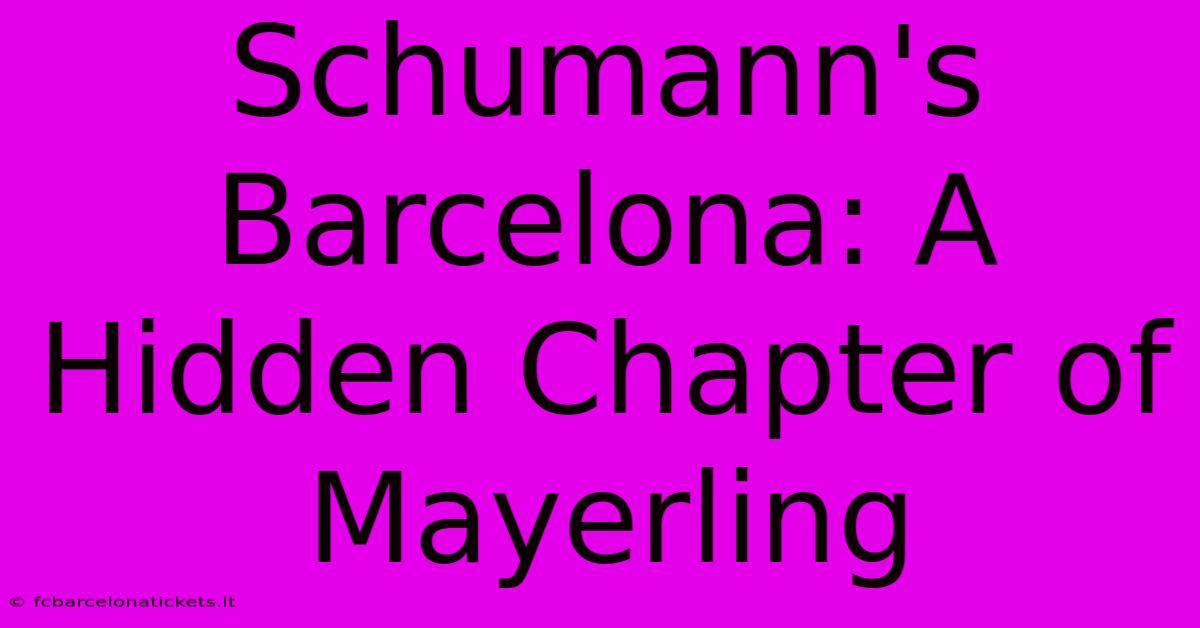Schumann's Barcelona: A Hidden Chapter Of Mayerling

Table of Contents
Schumann's Barcelona: A Hidden Chapter of Mayerling
The tragedy of Mayerling, the 1889 suicide pact of Crown Prince Rudolf of Austria and Baroness Mary Vetsera, remains one of history's most enduring mysteries. While numerous books and films have explored the event, one intriguing, and often overlooked, aspect is the potential connection to Robert Schumann's music, specifically its reception in Barcelona during a crucial period leading up to the tragedy. This article delves into this "hidden chapter," examining the circumstantial evidence and exploring the intriguing possibility of a less-discussed influence on the fateful events.
The Cultural Climate of Late 19th Century Barcelona
To understand the potential link, we must first consider the cultural atmosphere of Barcelona in the late 19th century. It was a period of burgeoning Catalan nationalism and artistic ferment, a city brimming with intellectual energy and a passionate embrace of European Romanticism. Schumann's music, with its emotional depth and dramatic intensity, resonated deeply with this climate. The city's elite, including individuals connected to the Habsburg court through diplomatic or social channels, would have been familiar with his work.
Schumann's Music and the Habsburg Court
The Habsburg court, known for its sophisticated taste in music and arts, was certainly well-acquainted with Schumann's compositions. It's plausible that Crown Prince Rudolf, known for his intellectual curiosity and artistic inclinations, would have been exposed to Schumann's works, possibly even through private performances or recordings (though technology was limited then). This familiarity with the composer’s emotional range could provide a critical context for interpreting the events leading up to Mayerling.
The Barcelona Connection: Speculation and Intrigue
The "Barcelona connection" rests primarily on circumstantial evidence and historical interpretation. Some historians suggest that communications, possibly coded messages or veiled references within diplomatic correspondence, between Barcelona and Vienna might allude to events connected to Rudolf and Vetsera. These communications, potentially intercepted or misconstrued, could have contributed to the growing tensions and ultimately, the tragic events at Mayerling.
Furthermore, the intensely emotional character of Schumann's music – pieces like the Fantasie in C major Op. 17 or the Dichterliebe song cycle – could have served as a powerful reflection of the internal struggles and passionate turmoil experienced by both Rudolf and Vetsera. The dramatic intensity of Schumann's music could have unintentionally provided a backdrop against which their tragic romance unfolded.
Unraveling the Mystery: Further Research
The connection between Schumann’s Barcelona reception and the Mayerling tragedy remains largely speculative. However, exploring this less-examined angle offers a fresh perspective on a well-documented historical event. Further research into contemporary records, including social diaries, correspondence between Viennese and Catalan elites, and detailed analysis of the musical landscape of late 19th-century Barcelona, may shed additional light on this intriguing possibility.
Conclusion: A Question of Context
While a direct causal link between Schumann’s music and the Mayerling tragedy is unlikely to be definitively proven, exploring the cultural context and the potential indirect influence of his music offers a richer understanding of the events. The "hidden chapter" of Schumann's Barcelona reception presents a fascinating avenue for historical investigation, forcing us to reconsider the multifaceted factors that contributed to one of history's most enduring enigmas. The passionate, emotionally charged atmosphere surrounding Schumann's music in Barcelona may have, in some indirect way, reflected the turbulent emotions that ultimately led to the tragic events at Mayerling. It's a compelling narrative that deserves further scholarly attention.

Thank you for visiting our website wich cover about Schumann's Barcelona: A Hidden Chapter Of Mayerling. We hope the information provided has been useful to you. Feel free to contact us if you have any questions or need further assistance. See you next time and dont miss to bookmark.
Featured Posts
-
Barcelona September 2024 Family Friendly Activities
Mar 31, 2025
-
Predict The Winner Barcelona Vs Atletico
Mar 31, 2025
-
Maremagnum Mall Indulge Your Shopping Cravings
Mar 31, 2025
-
Barcelona Shampoo Feel The Difference
Mar 31, 2025
-
Sun Kissed Streets Madrid Or Barcelona
Mar 31, 2025
